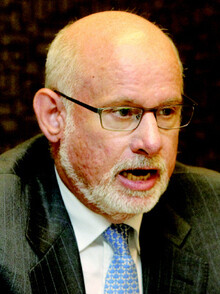hankyoreh
Links to other country sites 다른 나라 사이트 링크
US expert Joel Wit disputes claims that N. Korea follows a predictable pattern

By Park Hyun, Washington correspondent
The US Obama administration’s claims about a so-called pattern where North Korea extracts concessions through provocations and then does not follow through on its promises does not fit the facts, a US expert on nuclear weapons said.
“A constant mantra [is] recited by the White House as well as U.S. politicians, pundits, and media. It goes like this: we need to break the vicious cycle of North Korean threats; we pay them off, get nothing in return, and they just threaten us again,” wrote Joel Wit on the website of the current events magazine The Atlantic on May 5.
Wit spent ten years working for the US Department of State, where he participated in negotiations with North Korea. He continued: “Anyone familiar with the past 20 years of U.S.-North Korean relations knows this is not true. Indeed, my experience at the U.S. State Department from 1993 until 2002 tells me that talking to the North Koreans can serve our national interests.”
The US government often mentions the Agreed Framework, which was signed by the US and North Korea in Geneva in 1994, as a classic example of this North Korean pattern. But in reality, until this agreement fell apart, it stopped the development of North Korea’s multi-billion dollar nuclear weapons program without the US having to give North Korea much in return, Wit countered.
“At the time, secret American intelligence estimates projected that the North could build up to 100 nuclear weapons by the year 2000. By the time the arrangement collapsed in 2002, the North only had enough nuclear material for a handful of weapons. In return, it had received a few hundred million dollars worth of fuel oil plus unfinished nuclear power reactors in the form of two concrete-filled holes in the ground,” Wit added.
Wit’s argument is that the policy of “strategic patience” that the Obama administration has relied on since 2009, which holds that it is necessary to break the North Korean pattern and that North Korea must be the first to change, is misguided.
Negotiations with North Korea do not involve any more difficulties than what typically goes along with any other challenging diplomatic negotiations, Witt argued.
“The crisis on the Korean peninsula appears to have died down,” he wrote. “Now may be the right time to begin dialogue with the North Koreans to see whether there is a peaceful path forward.”
From 1993 to 1995, Wit served as senior aid to Robert Gallucci, who was the special envoy for the US Department of State to North Korea. After leaving that position, Wit was put in charge of the State Department’s North Korea policy, and took the lead in establishing the Korea Peninsula Energy Development Organization (KEDO). Today, he operates 38 North, a website on North Korea with the U.S.-Korea Institute at the Paul H. Nitze School of Advanced International Studies, John Hopkins University.
Please direct questions or comments to [english@hani.co.kr]
Editorial・opinion
![[Column] Season 2 of special prosecutor probe may be coming to Korea soon [Column] Season 2 of special prosecutor probe may be coming to Korea soon](https://flexible.img.hani.co.kr/flexible/normal/500/300/imgdb/original/2024/0426/3317141030699447.jpg) [Column] Season 2 of special prosecutor probe may be coming to Korea soon
[Column] Season 2 of special prosecutor probe may be coming to Korea soon![[Column] Park Geun-hye déjà vu in Yoon Suk-yeol [Column] Park Geun-hye déjà vu in Yoon Suk-yeol](https://flexible.img.hani.co.kr/flexible/normal/500/300/imgdb/original/2024/0424/651713945113788.jpg) [Column] Park Geun-hye déjà vu in Yoon Suk-yeol
[Column] Park Geun-hye déjà vu in Yoon Suk-yeol- [Editorial] New weight of N. Korea’s nuclear threats makes dialogue all the more urgent
- [Guest essay] The real reason Korea’s new right wants to dub Rhee a founding father
- [Column] ‘Choson’: Is it time we start referring to N. Korea in its own terms?
- [Editorial] Japan’s rewriting of history with Korea has gone too far
- [Column] The president’s questionable capacity for dialogue
- [Column] Are chaebol firms just pizza pies for families to divvy up as they please?
- [Column] Has Korea, too, crossed the Rubicon on China?
- [Correspondent’s column] In Japan’s alliance with US, echoes of its past alliances with UK
Most viewed articles
- 1[Column] Season 2 of special prosecutor probe may be coming to Korea soon
- 2‘We must say no’: Seoul defense chief on Korean, USFK involvement in hypothetical Taiwan crisis
- 3No good, very bad game for Korea puts it out of Olympics for first time since 1988
- 4Division commander ordered troops to enter raging flood waters before Marine died, survivor says
- 5Is Japan about to snatch control of Line messenger from Korea’s Naver?
- 6Korea’s 1.3% growth in Q1 signals ‘textbook’ return to growth, says government
- 7Is N. Korea threatening to test nukes in response to possible new US-led sanctions body?
- 8[Editorial] Korea’s surprise Q1 growth requires objective assessment, not blind fanfare
- 9[Editorial] New weight of N. Korea’s nuclear threats makes dialogue all the more urgent
- 10‘Weddingflation’ breaks the bank for Korean couples-to-be